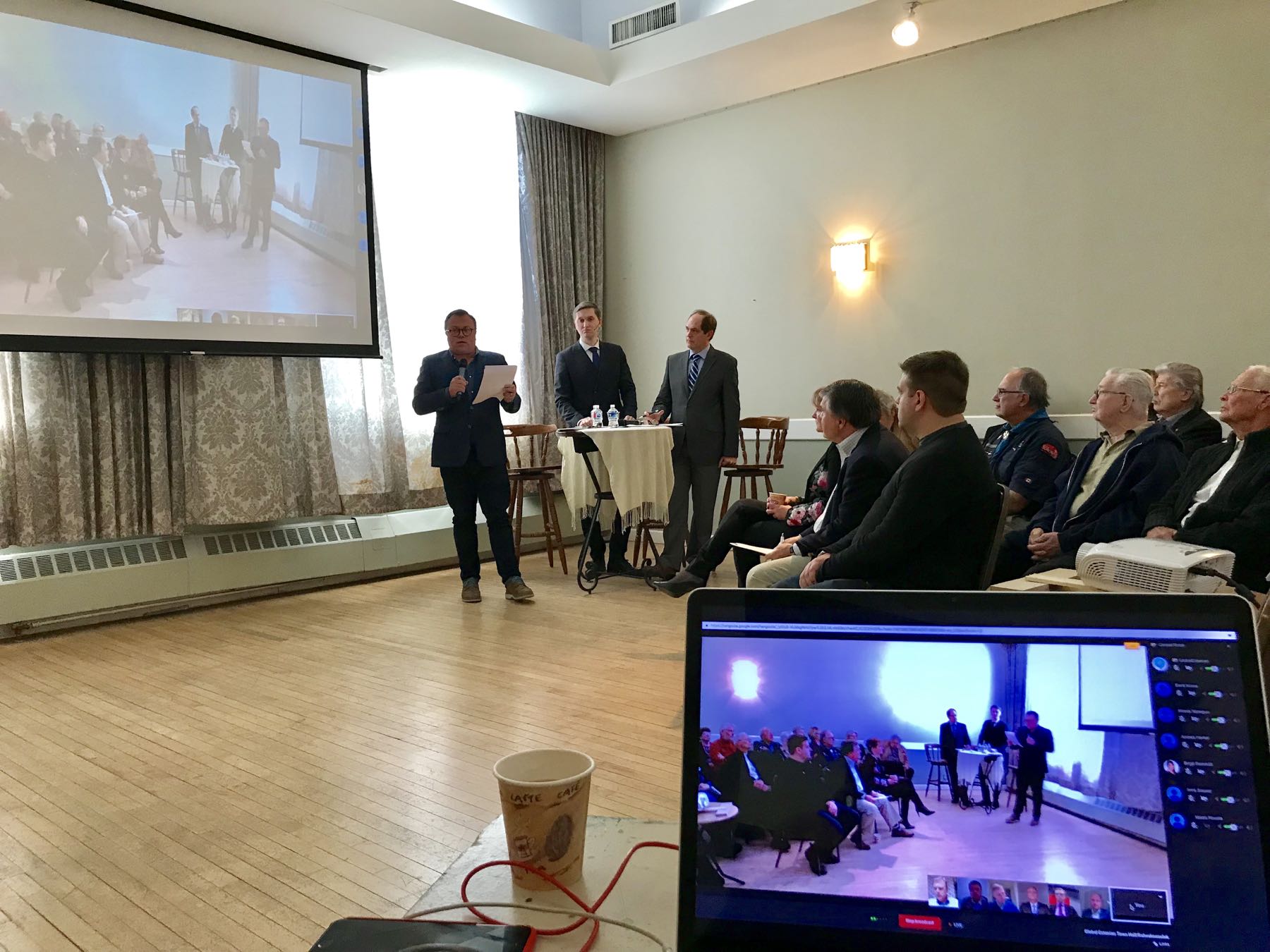Moderating the panel were Marcus Kolga, a prominent Canadian Estonian community leader and President of the Estonian Central Council in Canada (EKN); and Professor Andres Kasekamp, formerly of the University of Tartu and currently Chair of Estonian Studies at the University of Toronto.
Laas Leivat, honorary consul of Estonia in Toronto, provided opening remarks. He touched upon commonalities among Estonians abroad, stressing that the right to participate in Estonian elections comes with the responsibility to do so. According to Leivat, “every vote that is left unused can increase the influence of votes that do not care about the Estonian language, culture, nation nor the state’s security and independence.” In a rebuff to those in the global Estonian community who might avoid the vote, contending that they know little about Estonia or its politics, Leivat reminded the audience that the internet makes all relevant information accessible.
The internet and digital innovation have been central to Estonia’s success since re-independence. Given this, Marcus Kolga raised the importance of the new online Global Estonian portal, which was created by Canadian Estonians and gifted to the Estonian people as part of Estonia’s centenary. The initiative offers a free online global community and network for Estonians and friends of Estonia around the world, providing a potential complement to Estonia’s existing e-Residency programme.
Yet digital themes did not dominate the panel discussion, which comprised four questions: two from Kolga, and two from Kasekamp. Politicians responded individually in two minutes or less, elaborating on their party’s position on the respective matter.
Kolga focused on the global Estonian community, asking how important Estonians abroad are to Estonia, and how to better engage with these Estonians. He also asked whether or not the respective parties support building a greater knowledge in Estonia, such as in school curricula, of the global Estonian community and its history. Much of the discussion was devoted to issues related to dual citizenship, which is technically not allowed under Estonia’s laws. However, many Estonians abroad and their descendants hold dual citizenship both of Estonia, and of their country of birth.
Kasekamp inquired more generally, asking about how the interplay between values and interests should influence Estonian foreign and security policy; and also asking about each party’s vision for Estonia in ten years from now, including the country’s place in the world and the development of its society.
Questions were then taken from the audience, including questions sent from across the world. Among other topics, these questions touched on the extent to which it is possible to be Estonian without speaking the language; the future of Estonian IT and digital excellence; better engagement with Estonian citizens abroad regarding military service; and on preventing tax flows from Estonia.
The bulk of the discussion occurred in English, though questions from the audience were mostly answered in Estonian. The event was streamed live on both ERR and Postimees via YouTube. Final figures have not yet been released, but on Sunday alone over 500 people watched the ERR livestream and over 400 on YouTube. Almost 2000 people watched the Postimees stream, which was shared just under 200 times on Facebook.
The town hall was organised by the Estonian Central Council in Canada in cooperation with the union of Swedish Estonians, the Estonian American National Council, the Association of Australian Estonian Societies and the Estonian World Council. Over two dozen Estonian organisations were represented in the audience.
Reaction to the town hall by organisers and attendees was positive. Reached for comment, Marcus Kolga was pleased.
“The Town Hall blew away my expectations- there were hundreds of viewers online and we’ll wait to see how many others watch it in the days leading up to the election,” Kolga said.
Noting the participation of all major parties and the two government ministers, Kolga added that “this is definitely a positive sign for future cooperation with whomever forms the next Estonian government.” Andres Kasekamp was also satisfied.
“I was pleased, and somewhat surprised, that all the party representatives were generally optimistic and positive about Estonia’s future and did not engage in any mudslinging amongst themselves,” said Kasekamp after the event.
A similar event was organised four years ago for Estonia’s previous elections, but with fewer participating parties and a much lesser international reach.
Juku Gold, Toronto
Estonians abroad with valid citizenship can vote in various ways, including online, via letter mail, and at local embassies and/or consulates. For more information, see here: https://www.valimised.ee/en/estonian-elections-nutshell/voting-abroad.




